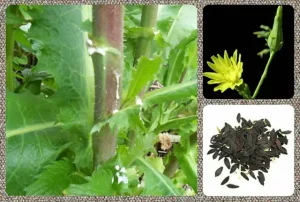
Lactucarium:
The milky sap, or lactucarium, found in prickly lettuce has been dubbed “lettuce opium” because of its mild sedative and analgesic properties.
Nutritional Content:
Though not as popular as its cultivated lettuce cousins, prickly lettuce is still a source of vitamins and minerals, including vitamin A, vitamin K, and iron.
Antioxidant Properties:
Some studies suggest that prickly lettuce has antioxidant properties which can combat free radicals in the body, promoting overall health.
3. How to Harvest Wild Lettuce

It’s best to harvest young leaves for culinary uses, as older leaves can be bitter. For medicinal uses, the plant’s sap or lactucarium can be harvested by making a small incision on the stem.
4. How to Use Prickly Lettuce

Medicinal Uses:
The sedative properties of prickly lettuce have been traditionally used to treat insomnia and anxiety. It can be used in tinctures, teas, or poultices.
Culinary Uses:
Young leaves can be added to salads or cooked similarly to greens. The stems can be boiled or stir-fried.









